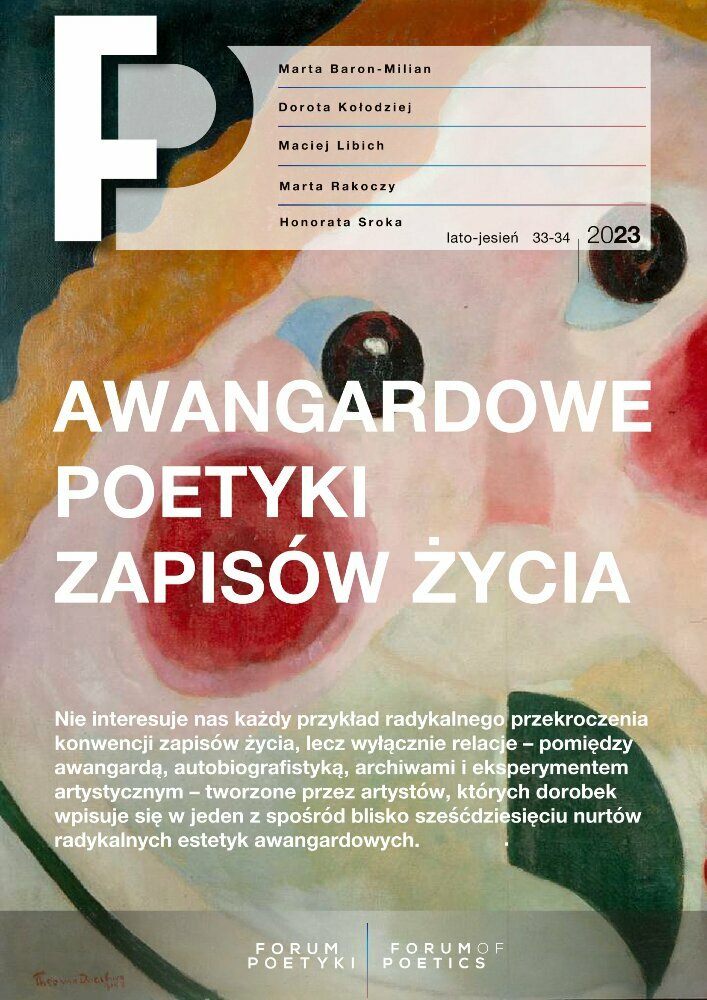Abstract
Analyzing Alexander Wat’s My Century as more than an account of an engaged participant in the events of Central and Eastern Europe, I would like to show its experimental potential, close to avant-garde aesthetics. This potential, in my opinion, was part of an extensive institutional-discursive field, as it was related to the oral turn in historiography of the second half of the 20th century processed in various ways in the social politics of memory. In my interpretation, Wat’s oral memoir was neither a fictional creation nor a non-fictional “testimony”. It was a genre of verbal creativity, which demanded in-depth reflection on its social location and meaning. In the case of My Age, it was necessary to perceive in the events happening between the actors negotiating the conversation with each other and the various story genres they activated. These events were full of ambivalence, tensions and negotiations that took place in the field of genres of uttering experience, the institutions that initiate them and their politically, socially and culturally empowered actors and discourses. They were also based on culturally and socially defined policies of retrieving, reclaiming, restoring, evoking or silencing memories, and the intentional and genre choices of Wat himself. Wat and Milosz opted for, as Alessandro Portelli characterized oral history in 1998, “dialogic shaping of discourse”, “rich heteroglossia” and “sequences of verbal processes and […] constructs generated by cultural and personal encounters”. In this article I want to show that this heteroglossia provoked different memory policies. It also constructed different ideologies of the voice of Central and Eastern European intellectuals.
References
Bell, Daniel. Kulturowe sprzeczności kapitalizmu Tłum. Stefan Amsterdamski, Warszawa: Aletheia, 2014.
Beverley, John. „Narracja świadka, podrzędność i autorytet narracyjny”. W: Metody badań jakościowych, red. Norman K. Denzin, Yvonna S. Lincoln, 761–774. Warszawa: PWN, 2009.
Chamberlain, Mary, Paul Thompson. „Introduction. Genre and Narrative in Life-Stories”. W: Narrative and genre, red. Mary Chamberlain, Paul Thompson, 1-22 London-New York: Routledge, 1998. DOI: https://doi.org/10.4324/9781315125008-1
Czapliński, Przemysław. „Rozmowa przeciw ekstazie. O kłopotach z autobiografią (nie tylko) komunistyczną”. Teksty Drugie 6 (2018): 11–30. DOI: https://doi.org/10.18318/td.2018.6.2
Czermińska, Małgorzata. Trójkąt autobiograficzny, Świadectwo, wyznanie, wyzwanie. Kraków: Universitas, 2020.
Feldman, Martha. „Why Voice Now?”. Journal of the American Musicological Society 3 (2015): 653–685. DOI: https://doi.org/10.1525/jams.2015.68.3.653
Filipkowski, Piotr. „Historia mówiona jako hermeneutyka losu. Doświadczenie przedtekstowe”. Teksty Drugie 1 (2018): 40–60. DOI: https://doi.org/10.18318/td.2018.1.3
Judt, Tony. Powojnie. Historia Europy od roku 1945. Tłum. Robert Bartołd. Poznań: Dom Wydawniczy Rebis, 2008.
Judt, Tony, Timothy Snyder. Rozważania o wieku XX. Tłum. Paweł Marczewski. Poznań: Rebis, 2021.Karpowicz, Agnieszka. „Poławianie gatunków. Twórczość słowna w antropologicznej sieci”. W: Od aforyzmu do zinu. Gatunki twórczości słownej, red. Grzegorz Godlewski, Agnieszka Karpowicz, Marta Rakoczy, Paweł Rodak, 7–27. Warszawa: Wydawnictwa Uniwersytetu Warszawskiego, 2014.Keane, Webb. „Indexing Voice: A Morality Tale”. Journal of Linguistic Anthropology 21/2 (2011): 166–178. DOI: https://doi.org/10.1111/j.1548-1395.2011.01104.x
Keane Webb. „Voice”. Journal of Linguistic Anthropology 1-2 (1999): 271-273 DOI: https://doi.org/10.1525/jlin.1999.9.1-2.271
Kmiecik, Michalina. „Paradoksy awangardowego zaangażowania. Milczenie artysty i rewolucja. Przypadek Aleksandra Wata”. Zagadnienia Rodzajów Literackich 2 (2019): 67–81.
Michalik, Sebastian. Przemoc i mowa w nowoczesnej myśli społecznej. Przyczynek do pojęcia negatywności politycznej. Warszawa: PWN, 2014.
Mickiewicz, Adam. „Literatura słowiańska. Kurs IV”. W: tegoż, Dzieła, t. XI. Warszawa: Czytelnik, 1998.
Paszek, Paweł. Aleksander Wat: forma życia. Studium o pisaniu, doświadczeniu, obecności, Katowice: Wydawnictwo Uniwersytetu Śląskiego 2021.
Pietrych, Krystyna. Aleksander Wat(re)lektury. Nowe konteksty, inne perspektywy, Łódź: Wydawnictwo Uniwersytetu Łódzkiego 2022.
Portelli, Alessandro. „Oczekuj nieoczekiwanego”. W: Opowiedziane. Historia mówiona w praktykach humanistycznych, red. Agnieszka Karpowicz, Małgorzata Litwinowicz-Droździel, Marta Rakoczy, 7–13. Warszawa: Instytut Kultury Polskiej, 2019.
Portelli, Alessandro. „Oral History as genre”. W: Narrative and genre, red. M. Chamberlain, P. Thompson, 23-45 London-New York: Routledge, 1998. DOI: https://doi.org/10.4324/9781315125008-2
Rodak, Paweł. „Autobiografia”. W: Od aforyzmu do zinu. Gatunki twórczości słownej, red. Grzegorz Godlewski, Agnieszka Karpowicz, Marta Rakoczy, Paweł Rodak. 43–50. Warszawa: Wydawnictwa Uniwersytetu Warszawskiego, 2014.
Rodak, Paweł. Między zapisem a literaturą. Dziennik polskiego pisarza w XX wieku. Warszawa: Wydawnictwa Uniwersytetu Warszawskiego, 2011.
Rodak, Paweł. „«Nie istnieje tu nic, zanim nie zostanie wypowiedziane». Rozmowa z Philippem Lejeune’em”. Teksty Drugie 2-3 (2003): 213–229.
Rojek, Przemysław. „Historia zmącona autobiografią”. Zagadnienia tożsamości narracyjnej w odniesieniu do powojennej liryki Aleksandra Wata. Kraków: Universitas, 2009.
Shore, Marci. Kawior i popiół. Życie i śmierć pokolenia oczarowanych i rozczarowanych marksizmem. Tłum. Marcin Szuster. Warszawa: Świat Książki, 2019.
Thompson, Paul, Joanna Bornat. Głos przeszłości. Wprowadzenie do historii mówionej. Tłum. Paweł Tomanek. Warszawa: Centrum Archiwistyki Społecznej, 2021.
Wat, Aleksander. Dziennik bez samogłosek. Transkrypcja i oprac. Michalina Kmiecik. Kraków: Wydawnictwo Uniwersytetu Jagiellońskiego, 2018.
Wat, Aleksander. „Jeszcze o reportażu”. Miesięcznik Literacki 10 (1930): 425-426
Wat, Aleksander. Mój wiek. Pamiętnik mówiony. T. 1-2. Warszawa: Czytelnik, 1990.
Witeska-Młynarczyk, Anna. „Can the Children Speak. Voice, Children and an ADHD Diagnosis in an Ethnographic Research”. Revue de Science Sociale 63 (2020): 46–57. DOI: https://doi.org/10.4000/revss.4902
Zajączkowski, Ryszard. „W archiwum Wata”. Pamiętnik Literacki 1 (2007): 145–161
License
Copyright (c) 2023 Marta Rakoczy

This work is licensed under a Creative Commons Attribution-NonCommercial-NoDerivatives 4.0 International License.
Authors of articles are responsible for securing the rights to other publications (texts, tables, drawings and other illustrations) quoted or reproduced in their texts.

